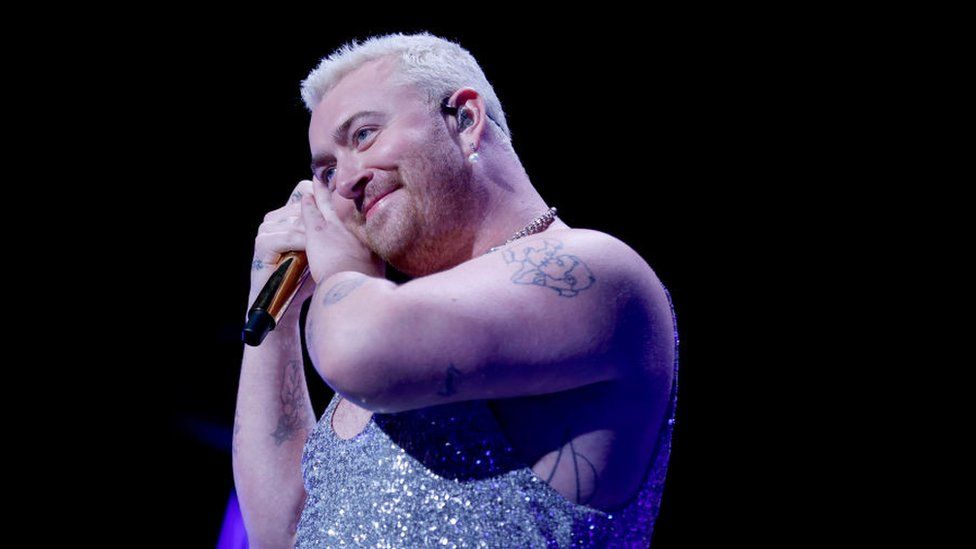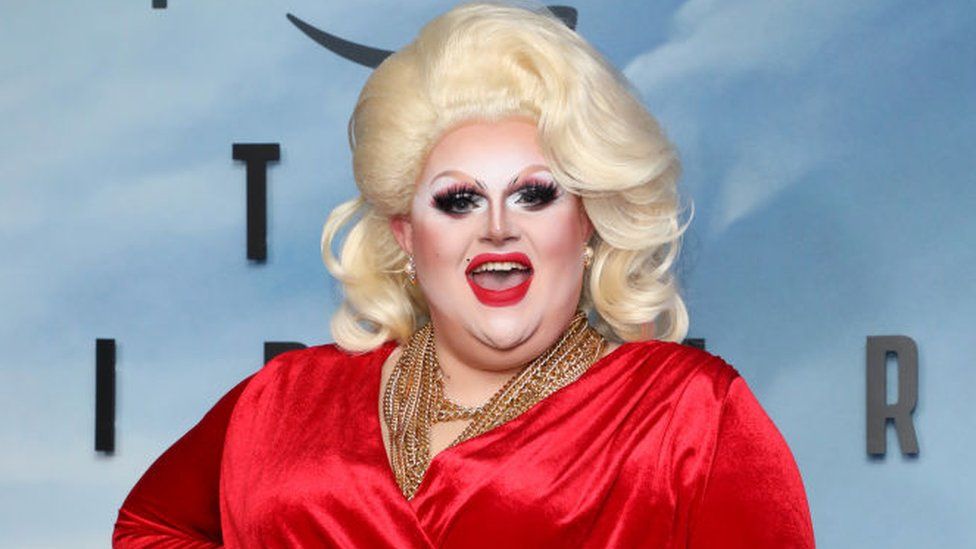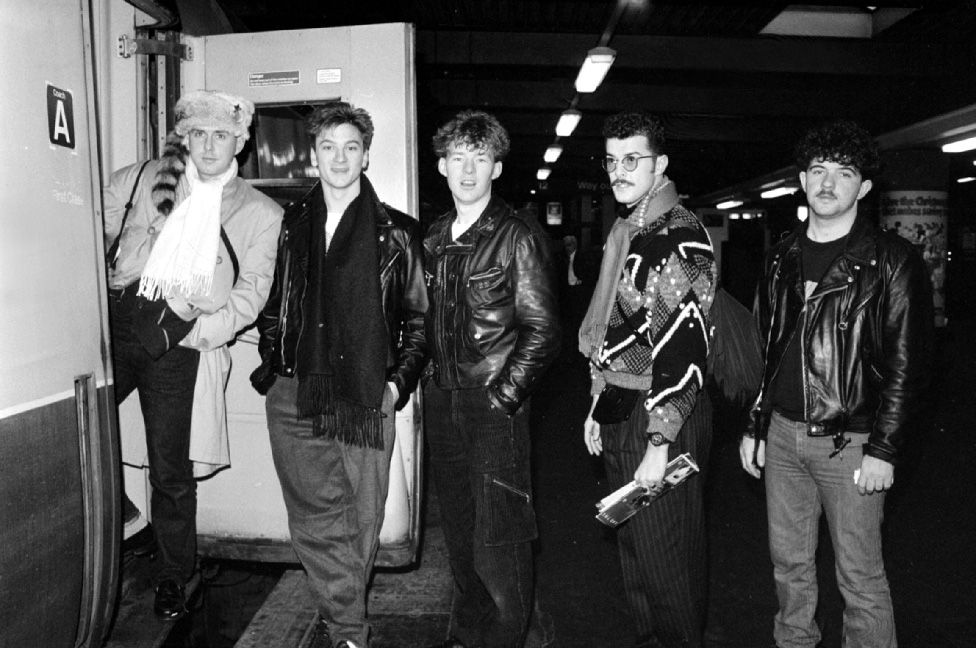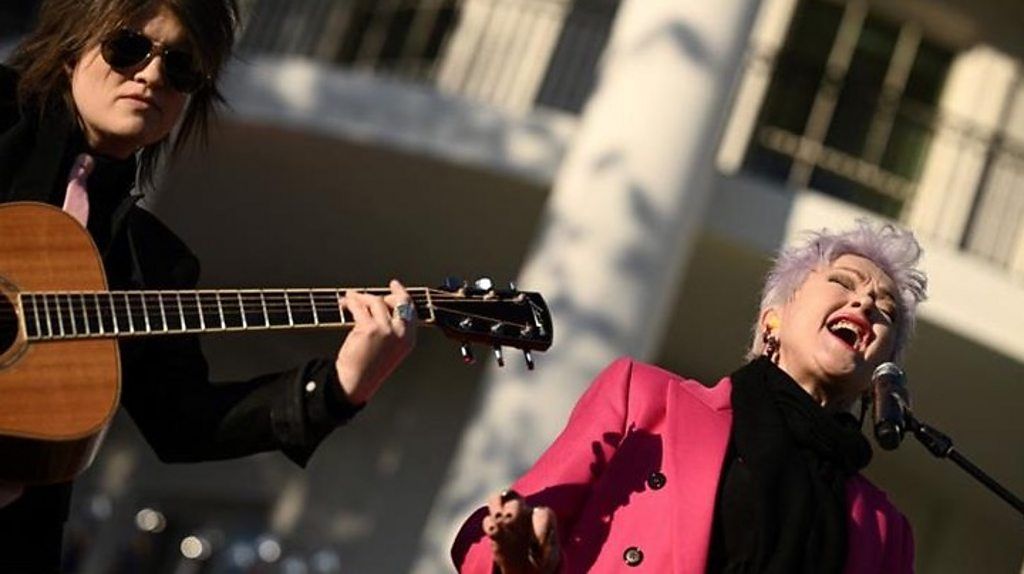 Getty Images
Getty ImagesWhen someone calls their new track I’m Not Here to Make Friends, they’re probably expecting a reaction.
And with their latest video, Sam Smith has certainly caused a bit of stir.
If you haven’t watched it, the singer spends most of it wearing a corset and nipple tassels while performing some spicy moves with backing dancers.
Some people think the video is “oversexualised” and want it to come with a warning. Others think Sam is a victim of double standards.
The video lands
The video for I’m Not Here to Make Friends starts with Sam, wearing an enormous pink coat, arriving at a remote castle by helicopter.
Once inside, dancers and drag queens surround the singer for a series of routines.
One scene in particular has upset some people – it shows Sam in that corset and nipple tassel look, posing suggestively while being showered with jets of water.
When the video was released it – predictably – took Youtube by storm, flying to the top of its trending chart,
It wasn’t long before Sam was trending on Twitter too, with a lot of posts calling the video “vulgar” and saying it was inappropriate for younger viewers.
Youtube’s restricted mode blocks the video. But fans say it’s no worse than others released by artists, many of them female, containing suggestive imagery.
Songs like Anaconda by Nicki Minaj, S&M by Rihanna or even Call On Me by Eric Prydz all capitalise on it.
Phobia?
Those who think Sam has been singled out have a theory.
In 2019, the singer came out as non-binary and asked to be described with they/them pronouns. Their new album, Gloria, fully embraces LGBT culture.
“If a female artist had done that exact same video, worn the exact same outfits, no one would bat an eyelid,” says drag queen Pixie Polite.
“I think the outcry just smacks of this sort of homophobia, queer phobia and transphobia.”

There’s also an element of fatphobia, says Pixie, as Sam doesn’t conform to stereotypical ideal body standards.
Since Sam came out as non-binary, fans think the singer has leaned in to their identity and it’s had an impact on their music.
“Sam Smith’s early work was very palatable to a mainstream audience, because they didn’t celebrate their queerness in the same way,” says Pixie.
“I think this is a coming of age moment for Sam Smith as an artist.”
Shock factor
Kenny Ethan Jones, a trans advocate and writer from London, agrees that Sam is entering an era of “embracing their queerness”.
“It’s really nice to see Sam really step into themselves,” says Kenny.
“I think Sam’s doing God’s work essentially, just allowing everybody to be represented and feel good in their body.”

Music video producer Ashleigh Jadee thinks this effort to put queer bodies at the centre of the video might be what’s sparked the reaction.
Ashleigh says it shows us a version of sexuality that we don’t often see, which gives it a shock factor, and there’s nothing new about seeing straight men and women on our screens.
For Ashleigh, I’m Not Here to Make Friends didn’t stand out as particularly spicy.
She says: “I watched the video and I was a bit like, ‘oh, is this it’?
“I can understand why some people might think it’s a bit too wild. But I think nowadays videos are really sexualised anyway.”

This isn’t the first time an artist has reflected their LGBT identity in their work.
Twenty-five years ago, George Michael was arrested by an undercover policeman in Los Angeles.
He caught the British singer performing a sex act in a public toilet and arrested him for cottaging.
George, who had not revealed his sexuality before this, came back with the music video for his song Outside – which featured dancers simulating sex in public and a lot of leather.
And before that, there was Relax by Frankie Goes to Hollywood, released in 1983.
The band had to make two videos for the song, as the first was set in a gay, S&M-themed nightclub and allegedly banned from TV.
And the BBC refused to play the song after one of it top DJs at the time, Mike Read, branded it “obscene”.
‘Paving the way’
“The tide of progress always ebbs and flows,” says Pixie.
“You will always have a slight push back before you then can move forward again and I think the culture war that’s happening at the moment around queer people and trans people, is definitely that pushback.”
In 2023, LGBT rights have made headlines – whether it’s the controversy around the gender reforms in Scotland or the Archbishop of Canterbury saying he won’t bless same-sex marriages.
“The slogan ‘we’re here, we’re queer, get used to it’, I think it’s as relevant today as it has always been,” says Pixie.
- A brief history of gender neutral pronouns
- The 1975 and Lewis Capaldi to play Big Weekend
- ‘Why I keep my lyrics gender neutral’
Kenny say’s he’s proud of Sam for confidently showcasing their identity in the video and their new album.
“It’s unfortunate that people who pave the way get the most hate, but essentially we have to do it,” says Kenny.
“If we don’t push through, and get through this mucky era then we’re never going to make progress.”


Follow Newsbeat on Twitter and YouTube.
Listen to Newsbeat live at 12:45 and 17:45 weekdays – or listen back here.
-
Cyndi Lauper and Sam Smith sing at White House
-
13 December 2022

-
-
A brief history of gender neutral pronouns
-
22 September 2019

-
-
Sam Smith changes pronouns to they/them
-
14 September 2019

-
-
9 male celebrities who’ve opened up about body image
-
13 February 2019

-
